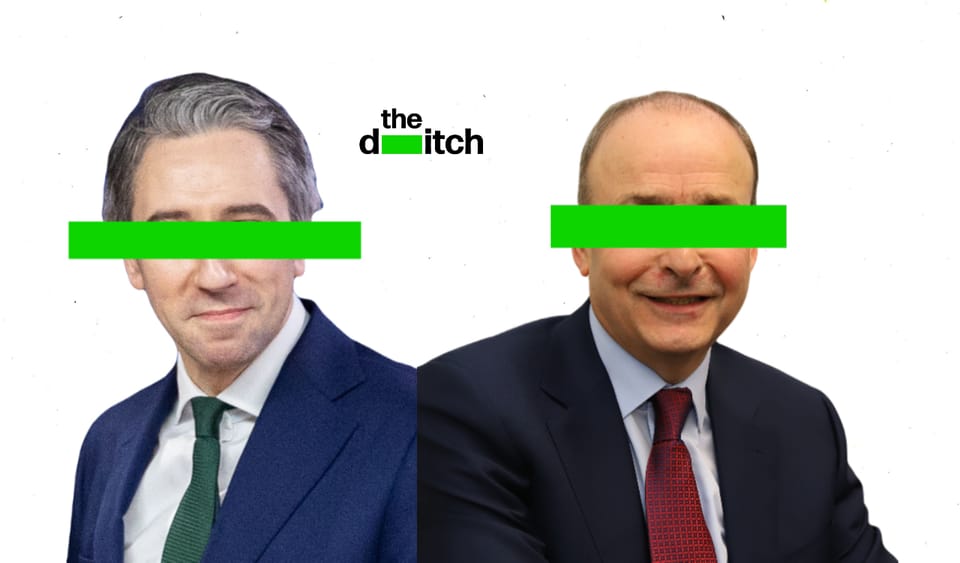Simon Harris wants voters to know he cares about Gaza.
Speaking to journalists last week he addressed the status of the Occupied Territories Bill, which would ban the import of goods, services and natural resources from illegal Israeli settlements in Palestine. He said the legislation – passed through the Seanad six years ago and the second stage of the Dáil shortly after but blocked by government ever since – warrants seriousness and scrutiny. That means opposition must refrain from their favourite pastime.
“I think it’s important that people don’t play politics with this,” Harris said. “Every country needs to use every lever at its disposal to maximise the pressure to bring about a ceasefire – and Ireland is taking real, practical action in relation to that.”
Playing politics, like 'common sense,' doesn’t have a clear definition. If it carries any meaning at all, it seems to describe the exploitation of an issue for the benefit of a political party rather than the public, the invocation of a problem to score points and not an attempt to resolve it. When used by Harris it serves two purposes: dismissing legitimate criticism and elevating his government’s blocking of popular legislation to a form of restraint.
These phrases are what the philosophers Ernesto Laclau and Chantal Mouffe might call empty signifiers – ambiguous terms that appear neutral but work to maintain existing power structures and delegitimise challenges to that power. You’ve heard them before: appeals to "maturity" and "respectability," calls for "stability”, demands to "grow up” and be “sensible”. The state deploys allegations of playing politics most forcefully when crisis is most acute; the more urgent the situation, the more enthusiastically demands for action are dismissed as cynical political theatre.
Playing politics: that perennial impediment to a government that is acting, we are assured, in good faith.
Empty words, empty phrases
Consider Tánaiste Micheál Martin. No one has accused others of playing politics more frequently than Ireland's Most Decent Man, according to Kildare Street. In March this year Matt Carthy and Gary Gannon, the Sinn Féin and Social Democrats foreign affairs spokespersons, wanted details about government's response to genocide in Palestine, which has by now killed at least 44,000 people and displaced roughly 90 percent of the Gazan population. Both, said Martin, were playing politics.
"I regret how this debate is being conducted because it is more about playing politics," he said, answering a question about when Ireland would follow through on its pledge to intervene in South Africa's genocide case against Israel at the International Court of Justice. (Government now says it won’t be till the end of this year that it intervenes.)
Not only has Ireland refused to impose a single economic sanction on – and here’s another empty signifier – the only democracy in the Middle East, it has increased its exports of dual use goods to Israel and refuses to enforce its own aviation laws to prevent the illegal transport of weapons through Irish sovereign airspace.
Dangling the Occupied Territories Bill before voters seeking to stop mass murder – moderate legislation that was the bare minimum Ireland could do when proposed six years ago – while declining opposition offers to debate it is more prevarication. Discussing it earlier this week, Martin stuck to his government’s script. “It's an extraordinary position that the opposition is saying we should ram a bill through that is, as currently written, unconstitutional,” he said, warning it “would fall at its first hurdle”. The opposition, he said, is “doing a disservice to the seriousness of the issue by playing politics with it”.
Remarkably Martin later claimed that government is “bound” by the attorney general’s advice – advice his government had no issue ignoring earlier this year.
Martin despises accountability and is a master of deflection. As I've discussed before, few invoke the conflict in the north of Ireland to dismiss questions in the Dáil chamber as often. Calls for substantive measures in response to genocide in Palestine are now playing politics.
Meeting my very good friend, whom I am also afraid of
Here’s Ireland: a country that overwhelmingly supports Palestinians but whose government repeats the rhetoric of génocidaires trying to eradicate them. Terms like "Israel has the right to defend itself" and unfounded claims about "human shields" function to obscure occupation, colonialism and genocide. For the Irish political establishment, they have an additional utility: signalling to the United States that, despite our declarations of Palestinian solidarity, we remain an obedient little client state.
The leaders of this state whose economy is dependent on American – and EU – foreign direct investment think we can't afford to upset US power. This isn't speculation. Last October US ambassador Claire Cronin warned government of "consequences" if the Occupied Territories Bill proceeded, citing concerns for US companies in Ireland. Ninety minutes after her email, Martin announced a "review" rather than enactment of the bill. Ten days later Cronin posted on X about Harris announcing 550 Microsoft jobs, praising "the ever-strengthening US-Ireland trade relationship”.
It’s obvious what’s happened here. But acknowledging it would reveal the true nature of our special relationship with the US: one of subordination, not friendship.
No government politician has dared criticise the US’s role in underwriting Israel's attacks on Gaza, the West Bank and Lebanon. Visiting the White House last month, Simon Harris, someone who is desperate to conjure a tough guy image when he thinks the moment calls for it, was timid when discussing Gaza with Biden.
"I made it clear the position of the Irish people, of the Irish government, that we know what it is like in Ireland to not feel seen by the world,” Harris said. “We know what it is like to have our national identity hijacked by a terrorist organisation. Because Palestine is not Hamas. Hamas is a despicable terrorist organisation and the terrorist attack they carried out on 7 October last year should be condemned forever by all right-thinking people.”
As with other western leaders talking about Palestine for the last 13 months, Harris first passed through what comedian Bassem Youssef describes as a "moral checkpoint" – the ritual condemnation of Palestinian armed resistance before any criticism of Israel is permitted. Then he could offer milquetoast observations about "proportionality" being "totally lost" and children "needlessly dying," careful to avoid mentioning who is killing them or with what high-tech bombs and guns and drones.
Harris also took the opportunity to take a dig at the IRA and, by extension, Sinn Féin. But this was perfectly legitimate – he would never play politics with this matter of utmost importance.
Simon Harris and Micheál Martin: ideologically interchangeable
Israeli government officials, emboldened by the total support of the US and EU, don’t need to use euphemistic language when speaking about the people of Gaza, whom they regard as subhuman, worthy of extermination. Former defence minister Yoav Gallant, now the subject of an International Criminal Court (ICC) arrest warrant request, said Gaza would face a "total blockade”, with “no electricity, no food, no fuel," that Israel was "fighting human animals”, and ordered his forces to "eliminate everything”. Benjamin Netanyahu, also the subject of an ICC arrest warrant request, called Gaza "the city of evil" and said the Israel Defense Forces is combatting "monsters”.
These are not rhetorical flourishes or empty signifiers. They are statements of genocidal intent, backed up by a year-long campaign of unbridled violence against a captive population.
Simon Harris and Micheál Martin, ideologically interchangeable, are preparing to campaign against each other under the pretence of difference, thinking they'll likely govern together again. While they engage in this charade, while they refuse to acknowledge Ireland's role in facilitating genocide, Israeli soldiers murder Palestinians with weapons that may have passed through Irish airspace – a practice government refuses to prevent despite warnings about flights before they passed over Ireland.
Empty words, empty signifiers may help Harris, Martin and their colleagues shirk responsibility for some level of actual action. But what, when it comes to Gaza, will this government be remembered for? People are being eradicated right now and unless Ireland does all it can to stop it, unless we stop facilitating what is happening, we are complicit. It’s not playing politics to acknowledge that.


